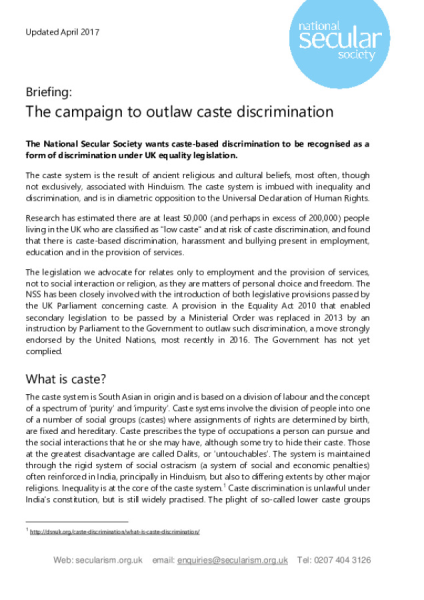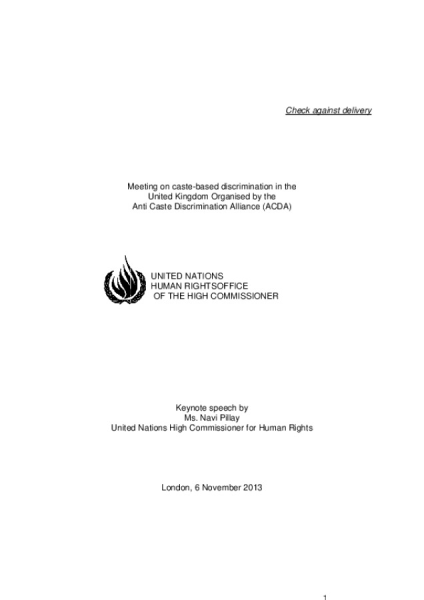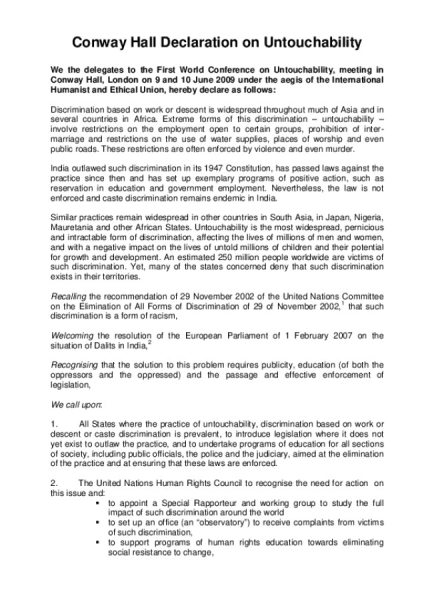
Outlaw 'caste' discrimination
Caste-based prejudice should have no place in modern Britain. We want to see caste-based discrimination explicitly recognised as a form of discrimination under UK equality legislation.
What's the problem?
The caste system is the result of ancient religious and cultural beliefs, most often, though not exclusively, associated with Hinduism. The caste system is imbued with inequality and discrimination, and is in diametric opposition to the Universal Declaration of Human Rights.
Research has estimated there are at least 50,000 (and perhaps in excess of 200,000) people living in the UK who are classified as "low caste" and at risk of caste discrimination, and found that there is caste-based discrimination, harassment and bullying present in employment, education and in the provision of services.
The Equality Act does not explicitly deal with the issue of caste, meaning victims of caste discrimination currently have to use unclear and precarious case law to secure justice. An express provision in the Equality Act 2010 would remove any legal uncertainty. Both Parliament and the United Nation Human Rights Council have called on the Government to explicitly outlaw caste-based discrimination, but it has delayed doing so for years.
In April 2017 the Government announced a long awaited public consultation on the issue of caste and the Equality Act 2010. This provides an opportunity to again press the Government to do the right thing and explicitly outlaw caste-based discrimination.
Find out more
Related news
House of Lords renews support for legislation to outlaw caste discrimination
Posted: Tue, 23 Apr 2013 08:58
The National Secular Society has praised the House of Lords for its renewed support of victims of caste discrimination in the UK after peers voted to retain their original amendment making caste a protected characteristic (as an aspect of race) under equality law.
MPs last week rejected a Lords amendment to make discrimination on grounds of caste unlawful via a new clause in the Enterprise and Regulatory Reform Bill. But late last night peers defeated the Government by 181 votes to 168, insisting that their amendment to outlaw caste must stand.
Last night's vote means the Bill will now return to the House of Commons (possibly tomorrow) with the amendment intact for MPs to vote again.
Keith Porteous Wood, executive director of the National Secular Society, commented:
"We are delighted that the Lords has reaffirmed the need for legislation, rather than kick the issue into the long grass as the Government and the majority of the Commons seems more inclined to do. 'Informal conciliation' is obviously no match for such deep-seated discrimination that ruins people's lives, as the Government is proposing, perhaps in deference to high caste (and high influence) Hindus.
"We urge peers to keep up the pressure on the elected house which will be anxious to resolve this issue in the next fortnight to avoid the entire Bill being lost when this Parliamentary session ends."
Read the debate in full at Hansard
For further details on this issue, please see our briefing on caste discrimination (pdf).
NSS accuses Government of showing contempt for Parliament and UK’s international obligations on caste discrimination
Posted: Mon, 5 Sep 2016 11:31
The National Secular Society has criticised the Government for "stalling" on caste discrimination after it announced plans for a consultation "on the issue of caste" despite already being under an obligation to outlaw such discrimination.
David Cameron's coalition Government initially promised a consultation in 2013 which it failed to deliver. Parliament subsequently committed to make caste a protected characteristic (as an aspect of race) under equality law via a clause in the Enterprise and Regulatory Reform Act 2013
Just last month the UN Committee on the Elimination of Racial Discrimination called on the UK to "invoke Section 9(5)(a) of the Equality Act 2010 without further delay to ensure that caste-based discrimination is explicitly prohibited under law and that victims of this form of discrimination have access to effective remedies".
Following years of delays and obstruction, Keith Porteous Wood, executive director of the National Secular Society, said that a consultation "at this stage is just a further attempt to stall implementing what parliament has instructed the Government to do."
Mr Wood continued: "By launching the consultation rather than taking action to outlaw caste-discrimination, the Government are displaying contempt for Parliament, the UN and our international obligations.
"In launching this consultation the Government are giving the oppressors the opportunity to seek to veto legislation to protect the oppressed. We invite the Prime Minister to consider how this approach to equality and Human Rights matches up to her commitment on taking office: 'For me, equality is about fairness. It is simply wrong for anyone to face discrimination or abuse because of who they are.'"
The Government Equalities Office said: "The government is to undertake a full public consultation on the issue of caste and the Equality Act 2010.
"A key aim of the consultation will be to obtain the views of the public on whether additional measures are needed to ensure victims of caste discrimination have appropriate legal protection and effective remedies under the 2010 Equality Act.
"Before taking any decisions, the Government will carefully consider the responses to the consultation, which will run for 12 weeks from its commencement date."
Victims of caste discrimination must currently rely on what Mr Wood described as "ambiguous and untested case law".
In July 2016, shortly before Theresa May took office, the National Secular Society urged the new Government to honour the will of parliament and the UK's international obligations by explicitly outlawing caste-based discrimination.
There is cross-party support for legislation to outlaw caste-based discrimination in the House of Lords.
During a debate on 11 July the Conservative peer Lord Deben told the House: "This is the first chance that a new Government have got to stand up and tell this House that they intend to obey the law. The only alternative is to tell this House that they intend to disobey the law. I do not believe that is a proper position for any Government."
NSS calls on Prime Minister to urgently enact legislation outlawing caste discrimination
Posted: Tue, 21 Jul 2015 14:57
The National Secular Society and Lord Eric Avebury have written jointly to the Prime Minister to protest against the Government's continuing failure to outlaw caste-based discrimination.
Despite announcing its intention make caste discrimination illegal by inserting a power into the Equality Act 2010, the Government delayed doing so for the entirety of the last parliament and appears set to continue to do nothing on the issue; which research suggests affects over well over 50,000 people in the UK.
The delay has prompted fears from campaigners over the poor state of legal protections for victims, and in light of the Government's continuing delay Lord Eric Avebury and the National Secular Society have jointly written to David Cameron to make the case for the "urgent enactment of legislation outlawing caste discrimination."
The Government's failure to legislate "is in breach of the UK's treaty obligations, running contrary to a recommendation of the UN Human Rights Council", the letter says.
"Leaving caste discrimination to case law makes it beyond the reach of victims," particularly because many of the victims have scant financial resources, by the very "nature of caste", the NSS has warned.
The NSS and Lord Avebury cited the case of the Begrajs, a couple who alleged caste discrimination on the part of their employer, and who have "been failed by both the justice system and, so far, the legislature."
The National Secular Society has pointed out that Parliament has now expressed an intention to legislate twice, but that in spite of this the Government has still refused to take action, leaving the matter to be established in case law- which is a prohibitively expensive option for victims to take.
The Government previously told the UN that it "intends to introduce legislation to make caste discrimination unlawful" and pledged to begin a public consultation process on prospective legislation. However, the letter notes, "almost a year later, these undertakings have not been honoured."
In addition, several honorary associates of the National Secular Society voiced their concerns in a recent debate in the House of Lords over the Government's continuing prevarication.
Lord Cashman asked if the Government would comply with the UN Committee on the Elimination of Racial Discrimination's recommendations on caste, but was told only that the Government was "actively considering" the matter – a phrase which was repeated throughout the debate by Baroness Williams, a Minister in the DCLG.
Lord Avebury asked to know which organisations had been campaigning against the change, but no answer was immediately forthcoming.
Lord Desai asked if the problem was that "that the majority Hindu and Sikh organisations are responsible for discrimination of the minority in their own ethnic origin community?"
He added, "I do not think that one should quietly concede the majority's view in this respect."
Baroness Flather pressed this point further, and argued: "The Hindu community says that there is no caste discrimination in this country and therefore we do not need this subsection. Fine—but if that is the case, why are they fighting so hard against it?"
"Because they are fighting so hard," she said, "it leads me to believe that there is discrimination."
However Lord Popat, a Conservative peer, said the "vast majority of the British Hindu and Sikh community" would be "outraged" if the Equality Act were amended to ban caste discrimination.
Baroness Williams said she agreed with Lord Popat that the issue is "divisive."
The Baroness added that the Government did not want to "exacerbate the problem", after Lord Popat claimed that any amendment outlawing caste discrimination would be a "blow to community cohesion".
A legal opinion commissioned by the National Secular Society in 2013 was scathing of the Government's inaction and concluded that the UK is "obliged in international human rights law to legislate for caste discrimination and further obliged to provide victims of such discrimination with an effective remedy."
The failure to do this, the opinion finds, "cannot be justified, either in principle or on the facts, by the necessity of either further evidence gathering or consultation."
"As a matter of international law", legislation prohibiting caste-based discrimination must be "enacted without delay."
That legal opinion, which has previously been shown to Ministers, has now been sent directly to the Prime Minister.
The National Secular Society's executive director, Keith Porteous Wood, commented: "That legal opinion was written two years ago and the Government's delay then was indefensible. To still be waiting in 2015 is inexplicable."
NSS condemns Government's callous disregard for UK victims of caste discrimination
Posted: Tue, 16 Apr 2013 21:25
The National Secular Society has criticised the Government's "callous" disregard for victims of caste discrimination in the UK after MPs rejected a Lords amendment to make discrimination on grounds of caste unlawful.
The House of Lords voted last month by a majority of 103, despite Government opposition, to make caste a protected characteristic (as an aspect of race) under equality law via a new clause in the Enterprise and Regulatory Reform Bill.
Today's vote in the Commons was lost by 243 votes to 307, with the Government speaking against the amendment. It will return to the Lords on Monday 22 April.
Equalities minister Jo Swinson told MPs that she thought legislation could increase stigma rather than ease the problem. She said: "This is an issue that is contained in the Hindu and Sikh communities. That's why we are working with those communities to address these problems."
However, Conservative MP Richard Fuller said: "This is a straightforward issue, caste discrimination in the work place is wrong and the people who suffer from it deserve legal protection. That's it. Beginning and end.
"Meena Varma of the Dalit Solidarity Network said: "I am very disappointed. But we'll keep going until we get this legislation."
Keith Porteous Wood, executive director of the National Secular Society, which has campaigned for several years for caste discrimination to be made unlawful, commented: "I hope that peers will seize the opportunity next week to vote once more in favour of making caste discrimination unlawful, reversing the Government's cynical and callous rejection of it today. In opposing statutory protection now, the Government has kicked the issue into the long grass, shamelessly abandoning its international Human Rights obligations, instead apparently paying greater heed to those, however influential, who have a vested interest in perpetuating this debasing discrimination."
The National Secular Society has obtained a legal opinion, supported by leading equality lawyers, showing that the UK's failure to outlaw caste discrimination is a violation of Article 2(1) and 6 of the International Convention on the Elimination of All Forms of Racial Discrimination. The UN has formally recommended amending the Equality Act 2010 to make caste discrimination unlawful "in accordance with [the UK's] international human rights obligations".
Mr Porteous Wood said: "The Government's alternative of 'informal conciliation' is toothless and entirely inadequate, given the power wielded by those of high caste – often the employers of those subjected to caste discrimination, and the widespread and endemic nature of caste discrimination."
Prior to today's vote, The Christian Institute and the National Secular Society sent a joint letter to conservative and LibDem MPs urging them to support the Lords amendment.
NSS intervenes at UN Human Rights Council over UK failure to outlaw caste discrimination
Posted: Mon, 19 Sep 2016 13:50
The National Secular Society has spoken out at the UN Human Rights Council (UNHRC) to criticise the UK Government over its failure to tackle caste based discrimination, as the UN has repeatedly urged it do.
Josephine Macintosh (pictured right), speaking on behalf of the National Secular Society, told the UNHRC that the UK government had made "grossly inadequate" progress toward outlawing caste discrimination.
"In 2012, the Universal Periodic Review (UPR) recommended that the UK 'put in practice a national strategy to eliminate discrimination against caste' by adopting the Equality Act of 2010, which prohibits such discrimination.
"It reminded the UK of its human rights obligations, including the [Committee on the Elimination of Racial Discrimination's] General Recommendation 29 and recommendations of the Special Rapporteur on Contemporary Forms of Racism.
"Sadly, the UPR's recommendation did 'not enjoy the support of the United Kingdom'.
"Four years later, the CERD issued its Concluding Observations on the UK in which it also recommended that the UK invoke Section 9(5)(a) of the Equality Act 'without further delay to ensure that caste-based discrimination is explicitly prohibited under law' and for victims to have access to effective remedies."
The Equality Act allows the Government to make caste an aspect of race protected from discrimination under the legislation.
"The UK has failed to take this action. Instead, it stated that it hopes for 'the development of case-law that provides protection.' This is grossly inadequate."
Rather than explicitly outlawing discrimination based on caste as the UN has recommended and parliament has voted for, the Government recently announced a public consultation – many years after it first promised one, and long after it was urged by the United Nations to take legislative action.
"This is concerning as it risks so-called higher caste and those wishing to discriminate on grounds of caste to oppose the legislation," the NSS said.
"We therefore call on all member states to encourage the UK to legislate to implement its international obligations in respect of caste, in line with its human rights obligations, as recommended by the UN, and indeed as required by the UK Parliament."
The intervention can be watched here: http://webtv.un.org/meetings-events/watch/item4-general-debate-14th-meeting-33rd-regular-session-human-rights-council-/5131061115001 (Scroll down to intervention 49: National Secular Society, Ms. Josephine Macintosh)
The intervention can be read in full here: https://www.secularism.org.uk/uploads/nss-intervention-at-uncrc-sept2016-caste.pdf




